The Grand Ole Opry (10 page)
Read The Grand Ole Opry Online
Authors: Colin Escott
One of those who appreciated Pee Wee’s style and sophistication was a struggling young singer, Eddy Arnold. Originally from
rural Tennessee, Eddy was living in St. Louis in 1939 when he heard that Pee Wee’s singer, Jack Skaggs, was leaving. He wrote
a letter that ended up in the hands of J. L. Frank and followed it with an audition disc. Hired as of January 1940, Eddy later
joked that he spent as much time selling Pee Wee’s songbooks and sweeping out the auditorium as he did onstage, but he came
to share Pee Wee’s goal of broadening country music’s appeal.
Many Opry listeners only knew Pee Wee’s name. He didn’t sing, and was so self-conscious about his starkly northern accent
that he usually left emceeing duties to his band-members. Because he’d never been
country,
Pee Wee wasn’t betraying or forsaking country music in edging closer to pop. More contentiously, he probably introduced the
electric guitar and drums to the Opry stage. Always out of place on the Opry, Pee Wee returned to Louisville in 1947 to work
in what was then the new medium of television. He went on to cowrite three songs that became pop and country standards, “Tennessee
Waltz,” “Slow Poke,” and “You Belong to Me.”
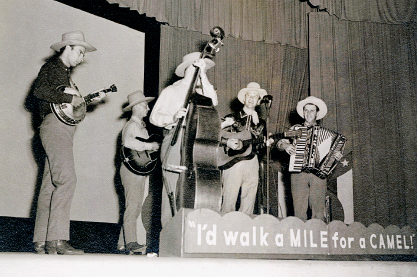
Eddy Arnold singing with Pee Wee King’s Golden West Cowboys.
GRANT TURNER:
Roy Acuff gave the Grand Ole Opry its voice.
Roy Claxton Acuff was born in Maynardville, near Knoxville, Ten-nessee, on September 15, 1903. He grew up on a tenant farm
in the foothills of the Smoky Mountains, and played semipro baseball until sidelined by a debilitating bout of sunstroke.
During the layoff, he honed his skill on the fiddle, and, after his recovery, he formed the Crazy Ten-E-Seeans. Based in Knoxville,
Roy Acuff first appeared on the Grand Ole Opry in October 1937, but didn’t do well.
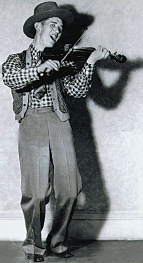
Roy Acuff: “I was hired at the Opry as a fiddle player. Country music in the late 1930s was mostly instrumental. I never would
have lasted as a fiddle player. I’ve stuck around all of these years because of my singing.”
DAVID COBB, WSM announcer:
I sincerely did not want to say anything to hurt Roy’s reputation, but I said the
.
sooner he found another way to make a living, the better it would be for him.
PEE WEE KING:
My manager, Joe Frank, was the one who gave Roy his first big boost. He contacted Roy and said, “Man, you’re missing the big
boat. You don’t have to be
.”
stuck in a little town like Knoxville. Come on down to Nashville. You can go national.” Roy was skittish about leaving Knoxville,
especially since he’d been turned down by the Opry once.
Roy was offered another on-air audition on February 5, 1938.
DAVID STONE:
There was a gap in the program. Someone stopped too early or didn’t show up. I crooked my finger at Roy. He came out and I
introduced him, and Roy said he was going to sing “The Great Speckled Bird.” Come Monday morning, the powers that be wanted
to know who was the guy singing about the bird. But as the morning went on, the lanky guy who was head of our mail department
called up and said, “What are we going to do about all these letters coming about something to do with a bird?” We went down
to the mail room and there were several stacks of mail just for Roy.
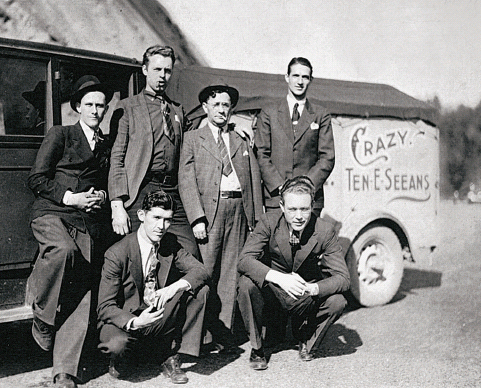
Soon after coming to the Opry, Roy Acuff’s Crazy Ten-E-Seeans became the not-so-crazy Smoky Mountain Boys.
ROY ACUFF:
You didn’t get on the Opry for singing a song or having a hit number. They didn’t ask you if you ever recorded. They didn’t
care. You had to be a showman. The only way you could get on was to have something to show and prove it. When I came back,
I was supposed to fiddle, and I did. But I sang “The Great Speckled Bird” that night. The audience reaction was overwhelmingly
positive. The np1 day, we had to be in Dawson Springs, Kentucky, then I went back to Knoxville, and in two weeks they sent
my mail. It came in bushel baskets.
The Delmore Brothers were the Opry’s biggest attraction, and they took up for the performer who would soon supplant them.
ALTON DELMORE:
On Monday morning I went to see David Stone about the band we wanted to play with us. He wanted to get us back on the road.
He asked me, “Have you decided who you want to play your dates with you?” “Yes, we want Roy Acuff.” “And, if I may ask, who
the hell is he?” “He’s the leader of the last band that played last Saturday.” “I’ll be goddamned if I think I’ll ever be
able to understand you crazy hillbillies. Here you are picking the worst band that played.”
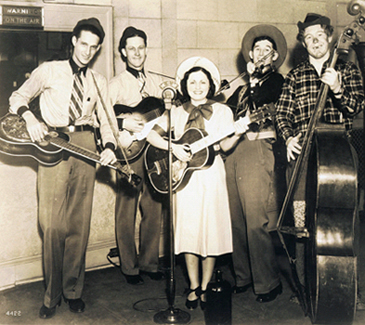
The group Roy Acuff brought to the Opry in 1938. From left: Clell Summey, Jess Easterday, Imogene “Tiny” Sarrett, Acuff, and
Red Jones.
At the Delmores’ request, David Stone wrote to Roy Acuff offering him a job:
Dear Roy,
I am in receipt of your telegram advising that you will be here for programs starting the 19th. I will book you for a spot
on the Grand Ole Opry, and also a series of 7:00 a.m. programs starting Monday February 21st.
I am teaming you up with the Delmore Brothers for several personal appearances. These boys have tremendous popularity in this
territory, but they cannot manage or build their own unit so I think it would be a great combination for the two acts. I think
I can get some good dates right away and start you out as soon as you get here. This will save a great deal of time in getting
your build up with the WSM audience.
Yours very truly,
David P. Stone.
February 10, 1938
ROY ACUFF:
That song, “The Great Speckled Bird,” was what done it. I’d heard the song over around Knoxville and paid a guy to copy it
down for me. It was written by a preacher in Springfield, Missouri. I met him once. I never knew who the writer was all those
years. The song was stolen from him.
When I came to the Opry, I called my band the Crazy Ten-E-Seeans. David Stone wanted a name change. I came up with Smoky Mountain
Boys to get in a plug for my homeland of east Tennessee. You know, if it hadn’t been for the Opry, I think I might have fallen
by the wayside. It was like a network show. With the fifty-thousand-watt clear channel, we were covering everything from the
Rocky Mountains to Maine, and from Canada into the islands off the Florida coast. I didn’t realize how different my singing
was until the mail started coming in. The letters would mention how clear I was coming through, and how distinct my voice
was, and how they could understand the words. When I got started, my goal wasn’t wealth. I only wanted to do something I enjoy.
No city of any size would accept hillbilly performers, so we played schoolhouses out in the woods and small theaters in small
towns. Twenty-five dollars was a big gate. I didn’t get my first one-hundred-dollar gate until along about 1940. That was
at the McFadden School in Murfreesboro.
ALTON DELMORE:
Roy was a hungry person. Not for food or security, but to make a little niche. I believe Roy’s carelessness for security really
benefitted him more than anything because he didn’t seem to worry if we had a good date or a bad one as far as money was concerned.
He just wanted to make good as an entertainer. And he was a natural salesman. He could sell himself on the stage anytime.
The Delmore Brothers left the Opry seven months after Acuff arrived. By then, Judge Hay was back, encouraging Acuff to sing
the “heart” songs. Acuff complied, and his influence became inestimable.
HANK WILLIAMS:
Roy Acuff is the best example of sincerity in singing. He’s the biggest singer this music ever knew. You booked him and you
didn’t worry about crowds. For drawing power in the South, it was Roy Acuff then God. He’d stand up there singing, tears running
down his cheeks.
ROY ACUFF:
I like to get into the mood of a song. If you don’t feel it, you can’t sing it. You can’t fool a person out there. I’ve cried
onstage, not just for that audience, but I’ve cried because I wanted to cry. Because it was hurting.
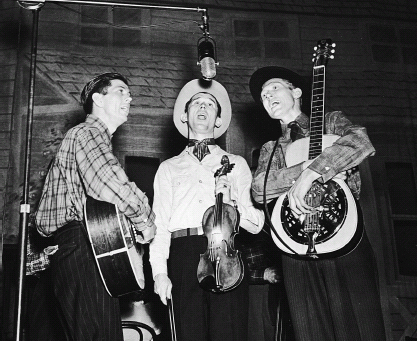
Roy Acuff gives it all he’s got with guitar player Lon Wilson and right-hand man Pete “Bashful Brother Oswald” Kirby adding
the harmony.
Roy Acuff saw it all, from rural string bands to the dawn of New Country. To him, country music was just that: music for,
by, and of country people. No compromise, no artifice, no concessions. Those who live and die by chart statistics might wonder
why the man dubbed “The King of Country Music” just barely figures in the chart books, but Acuff made his mark before the
country charts started; in fact, his success was one of the reasons that the music industry took country music seriously enough
to start a country chart.
Bill Monroe was better known than Pee Wee King or Roy Acuff when he came to the Opry. As one of the Monroe Brothers, he’d
sold hundreds of thousands of records in the late years of the Depression, and the brothers had been a big draw in the Carolinas.
When Bill Monroe auditioned at the Opry, he was leading his Blue Grass Boys, but had yet to develop the style of music that
would later be known as bluegrass.